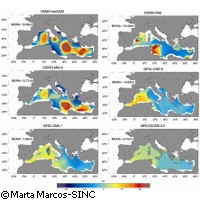Researchers predict Mediterranean Sea level rise
Climate change and increased greenhouse gases will raise the level of the Mediterranean Sea and ocean temperatures in this area, a Spanish-British research team has forecast. The scientists from the Mediterranean Institute for Advanced Studies (IMEDEA) and the National Oceanography Centre of Southampton in the UK analysed simulations based on three scenarios. Their aim is to predict the sea level, salinity and temperature of the Mediterranean in the 21st century. The study's findings were recently published in the Journal of Geophysical Research-Oceans. Based on the 12 atmosphere-ocean general circulation models (AOGCMs) used in the study, the scientists said higher concentrations of gases will trigger higher temperatures throughout the sea. 'The most positive scenario assumes that greenhouse gas concentrations remain constant at their levels in the year 2000, and even in this case, climate change still has an impact,' Dr Marta Marcos from the University of the Balearic Islands (UIB) in Spain and lead author of the study was quoted as saying by SINC (Scientific Information and News Service). 'The most negative scenario is based on diverse levels of economic development all over the world, with an ongoing increase in greenhouse gas production throughout the 21st century.' Assuming that the most positive scenario emerges, the temperatures of the Mediterranean Sea should not rise by more than 1°C by the end of 2099. However, the other two scenarios show greenhouse gases rising in the decades to come, leading to sea temperature increases of up to 2.5°C. According to the scientists, their findings also show that the temperatures will accelerate in this century. Temperature changes and more mass may also trigger changes in sea levels in the long run. 'The level of the whole Mediterranean will rise by between 3cm and 61cm on average as a result of the effects of warming,' Dr Marcos explained. She pointed out that despite the significance of understanding sea level rises in the coasts, 'it is here that we know least because of the low spatial resolution of the models'. Because climatic conditions will change substantially, it is not possible to make a completely precise prediction of the area's future. The models used in the study comprised a series of socioeconomic scenarios capable of predicting what lies in store for the area. Concerning the salinity of the area, the models showed that the Mediterranean will become saltier. But the scientists said the forecast is not 100% accurate. 'The variations in salinity in the Mediterranean are controlled by the exchange of water through the Straits of Gibraltar, and this has not been incorporated as an indicator, meaning the related results are not very reliable,' said Dr Marcos and Dr Michael Tsimplis, a researcher at the National Oceanography Centre of Southampton. According to them, IPCC models have very low spatial resolution. So while they are capable of showing global processes 'reasonably well', the challenge emerges with regional ones, where it is harder for the researchers to 'be sure of the scale of the changes', Dr Marcos said. Drs Marcos and Tsimplis said the Straits of Gibraltar are not well reproduced in the models. They added that global models cannot calculate the impact of sea level rise in coastal areas 'because of the high level of regional variability for this factor'. The scientists believe that using high-resolution, regional climate models would resolve this problem, particularly since they would show the Mediterranean straits and oceanic processes (occurring within the ocean's basin and coastal areas) with greater clarity. European researchers focusing on the prediction of climate change effects at regional level are targeting such a strategy and they believe that predictions made will become more certain over the short term. IMEDEA is a joint centre run by UIB and the Spanish National Research Council (CSIC).
Countries
Spain, United Kingdom



